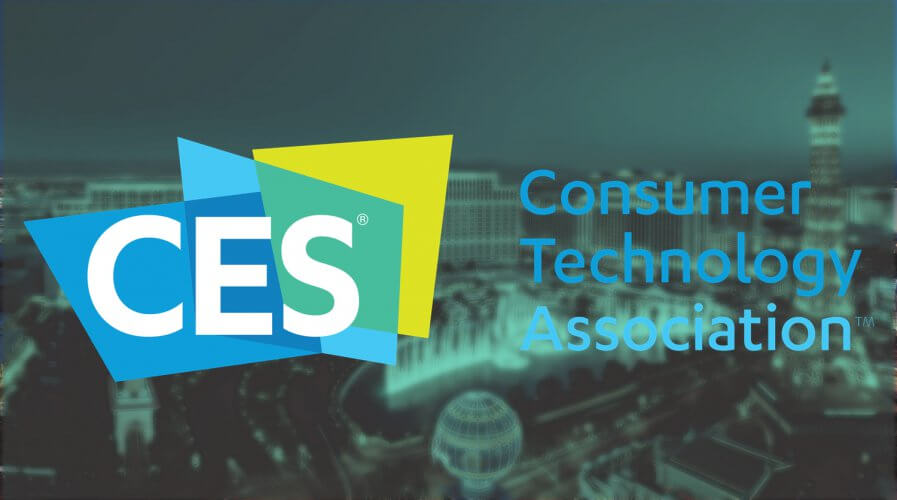
What can the business world take away from the Consumer Electronic Show, 2018? Source: CES
CES 2018: what business might take away
ANYONE in the tech world will be aware of the impending start of CES 2018 which begins Jan 9. Although its audience is trade-only (no members of the public are allowed on the show floor) CES is, as its name states, a consumer-oriented show. But many consumer technologies will percolate through into the business world, a trend already seen in spades since the beginning of the BYOD movement.
Companies from all over the world will be congregating in Las Vegas, in order to share their cutting-edge products: some are far-off pipedreams, but many use CES as a launch platform.
Some manufacturers, including Samsung and Sony, tend not to announce new phone handsets at CES, preferring Mobile World Congress which takes place next month. But everything else is a possibility, from miniature smart gadgets to massive autonomous trucks.
The show’s opening keynote address on Monday, Jan 8 at 18:30 (PT) will be from Brian Krzanich, Intel CEO. His focus is likely to be on next-generation technologies, including 5G, autonomous vehicles, virtual reality, and of course, the buzzphrase of the moment, artificial intelligence (AI). AI, naturally, promises to be a huge theme across the entire show.
The consumer business group CEO at Huawei, Richard Yu, will give Tuesday’s keynote (14:00 PT). Yu is expected to concentrate on the Internet of Things (IoT), smart devices, connectivity (specifically 5G) and artificial intelligence. Rumors are he may well also reveal some new products.
MediaTek will also have a significant presence at CES this year, having recently announced a serious push into the chipsets and connectivity technologies which underpin the next generation of connected devices, the IoT. The company is very much at the forefront of the infrastructure build of smart homes, smart buildings, cities, and interconnected businesses.
5G is expected to play a key role in the advancement of the Internet of Things, not only due to its higher speeds of data transfer but also due to its incredibly low latency. These two factors make it a kingpin in embedding connectivity into everyday devices, both in the consumer, public, and business spaces. We expect Sony, as well as MediaTek, among other players, to concentrate heavily on smart devices and artificial intelligence in 2018.
Artificial intelligence as a recurrent theme through CES will continue throughout the year and beyond in the tech space. Apart from anything else, machine learning or artificial intelligence is a mandatory element required to coherently process the petabytes of data which are expected to be produced by interconnected devices.
Also of interest to the business community will be the expected announcements from the big players in the autonomous vehicle market. CES has, in recent years, become something of a motor show by proxy. There has been an increasing convergence between motor manufacturers and technology giants, both in terms of sharing technology but also by dint of an increasing number of partnerships between the two verticals.
Korea’s Hyundai has announced it is entering a partnership with Aurora to put self-driving vehicles onto the market by 2021 and is expected, during its CES press conference, to be showcasing new autonomous features, plus a car powered by a new type of fuel cell.
#Hyundai and Aurora to develop level 4 autonomous vehicles by 2021. Read more: https://t.co/zi3iZDcv33 pic.twitter.com/XS6LpZXsay
— Hyundai Worldwide (@Hyundai_Global) January 5, 2018
Look out for announcements from Toyota and Volkswagen as well, the latter also partnering with Aurora with the aim of putting self-driving cars on the road by 2021.
Aurora is a start-up founded by engineers formerly of Google, Uber, and Tesla – you’ll see its name more and more often as vehicle autonomy spreads.
In more mundane areas, look out for a new iteration of Dell’s XPS laptop range, which is expected to be even thinner and more (some might say) MacBook Air-like than ever before. The XPS range will probably feature full USB C connectivity and even smaller screen bevel dimensions.
There will be, without doubt, increased integration between voice assistants such as Google Assistant & Amazon’s Alexa with everyday devices, a probable precursor (as discussed on these pages) of the move of the voice-activated assistant into the business environment.
Finally, there are likely to be multiple announcements regarding virtual and augmented reality (VR & AR) hard & software. While these technologies remain still far from common even in the consumer space, the tech is so new that it has yet to find any real foothold in the workplace. However, falling costs and increased processing and graphics muscle built into new headsets may well make this area more interesting in the future. Watch this space!
READ MORE
- The criticality of endpoint management in cybersecurity and operations
- Ethical AI: The renewed importance of safeguarding data and customer privacy in Generative AI applications
- How Japan balances AI-driven opportunities with cybersecurity needs
- Deploying SASE: Benchmarking your approach
- Insurance everywhere all at once: the digital transformation of the APAC insurance industry






